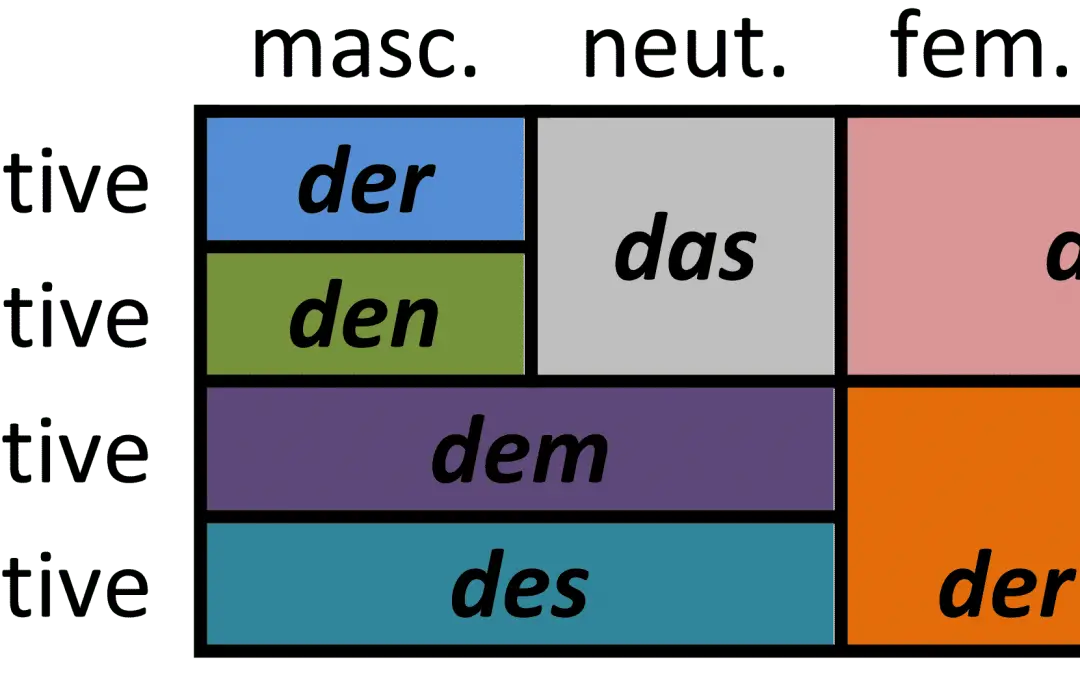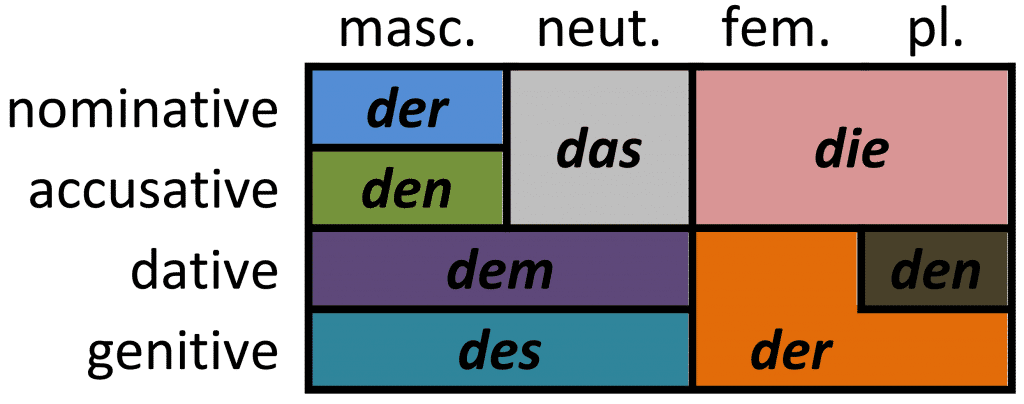Conquering the German Cases
German cases? For any German language learner, the cases play a huge role in how sentences are formed. You may already know that in German, we have the Nominative, Accusative, Dative, and Genitive case. Each of these have a different function. However, if there is any confusion about how each one works, then this page is definitely for you!
How can we understand the German cases?
There are a few things we need to know before we can completely understand the German cases.
1. German nouns have genders
If we look back to our post on German Nouns, you will remember that they have genders. For example, der Mann, die Katze, das Auto.
2. A German noun’s article changes depending on whether it is a subject, object, direct object or indirect object. This can help us know which case must be used… Let us take a closer look:
- The nominative case is used for the subject of sentences. The subject is the thing doing the action. For example in the sentence ‘The woman sang the song’, ‘The woman’ is the subject.
- The accusative case is for direct objects. The direct object is the person or thing that receives the action. For example if we take the same sentence as above, ‘the song’ is the direct object as it was sung. It will therefore will be in the accusative case.
- The dative case is for indirect objects. The indirect object is the person who ‘gets’ the direct object. For example, ‘The woman sang the song to the man‘. Here, the man is the indirect object, because the song was sang to him.
- The genitive case expresses possession. For example in English, we show possession with apostrophes such as, ‘The woman’s song’ or in basic terms, ‘the song of the woman’.
Got the basics? More on German Cases:
Like most German grammar rules, a table can come in very handy! It makes learning how the German cases much easier. Saying them out loud also helps as you can add a rhythm to it. This is the definite article table, the same works for the indefinite (ein). However, the masculine nominative stays as EIN, and likewise the accusative is EINEN, dative is EINEM, and genitive is EINES.
And now for some examples…
1. The nominative
The old man and his dog – Der alte Mann und sein Hund.
The woman is listening to music – Die Frau hört Musik.
The child goes to the park every morning – Das Kind geht jeden morgen in den Park.
Here, two cases are identified. Das Kind is the subject and therefore in the nominative. However, we know from our knowledge of prepositions, that IN + movement = the accusative case. So ‘der Park’ changes to ‘den Park’.
2. The accusative
As you can tell from the table, only the masculine form changes in the accusative. The rest stays the same as the nominative.
The children shared an apple – Die Kinder haben einen Apfel geteilt.
I am eating a piece of cake – Ich esse ein Stück Kuchen.
The man loves the woman – Der Mann liebt die Frau, or in contrast, The woman loves the man – Die Frau liebt den Mann.
3. The dative
I will send you the email – Ich werde dir die E-mail schicken.
Here, ‘dir‘ is the dative indirect object, and ‘eine E-mail’ becomes the accusative direct object.
The teacher gives the student a book – Der Lehrer gibt dem Schüler ein Buch.
Here, three German cases are seen. Der Lehrer, the subject and therefore nominative. He gives the book TO the student = the indirect object and therefore the dative. What does he give the student? A book, the accusative direct object.
I thanked the children – Ich habe den Kindern gedankt.
Giving thanks TO the children = ‘the children’ are the indirect objects and therefore in the dative case. We scan back to the table and see that plural dative = den. The nouns in dativ plural also get an additional n at the end.
4. The Genitive
We must remember that with masculine and neuter articles, the noun agrees. This is why we add an ‘s’ to the end of the noun.
My Father’s car – Das Auto meines Vaters.
My mother’s dog was very cute – Der Hund meiner Mutter war sehr süß
She collected her brother’s coat – Sie hat den Mantel ihres Bruders abgeholt.
Think you’ve conquered them?
You will have definitely conquered the German cases by now if you have read this through and understood the rules. However, this was just a taster of the grammar concepts that can be taught when learning the language. What to learn more? Why not check out our online German courses and see what classes we have on offer to suit your level and availability!


